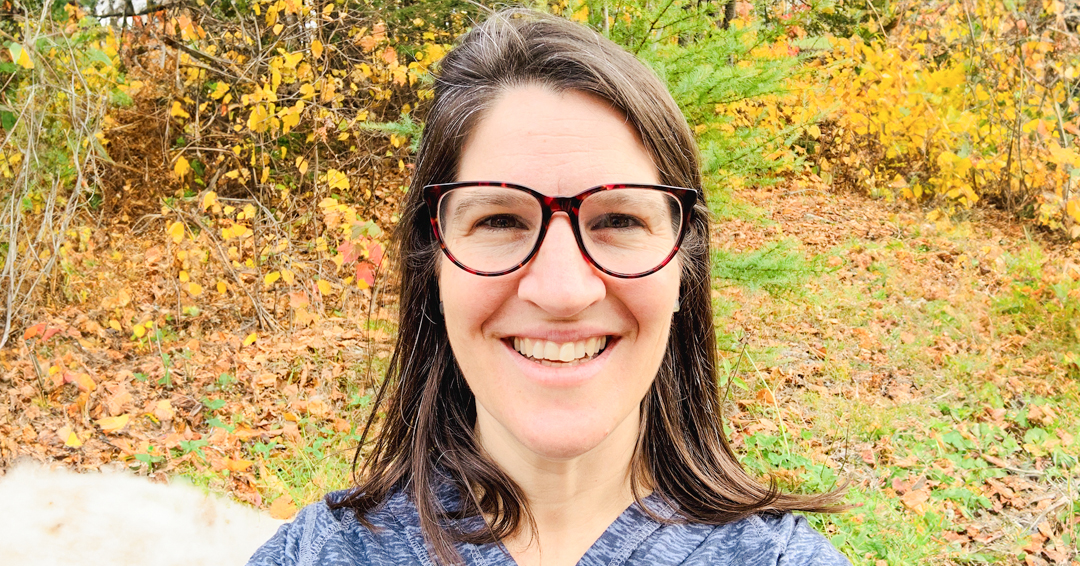
Part of our series: FMHS community members from away – The Faculty of Medicine and Health Sciences (FMHS) is made up of diverse communities, including people from across Canada and around the world. This series recognizes those from outside the province who have chosen to bring their talents and expertise to McGill University. Thank you for all that you contribute!
Ontario transplant Jodi Tuck, RN, HBSc, MScA, hit a big milestone this year: 20 years of nursing. We spoke to the Assistant Professor in the Ingram School of Nursing, Program Director of the MScA – Advanced Nursing program for nurse leaders and Global Health Concentration lead, about what drew her to Montreal – and kept her here – and her words of wisdom for nursing students who follow in her footsteps.
Can you tell us where you’re from and when and how you decided to come to Montreal?
I’m from Ontario, from the Toronto area – Markham. I came in 2000 to do my nursing studies and stayed. I originally came here to study for three years. I just really enjoyed the city, the culture and I got my licence here and have only worked in Quebec, actually.
What degree did you do at McGill?
I did the direct entry master’s program – it’s the only one like it in Canada. A lot of our nurse leaders have done this program and have stayed here and contributed. Unfortunately, as far as we know, this program would be affected by the proposed tuition hike as it’s not a thesis program, it’s a professional degree.
How was your French when you arrived?
I didn’t speak French that well when I came here, but I became bilingual in order to practise as a nurse. You have to be fully fluent in French and have to pass an Office de la langue française exam.
What did you do to improve your French?
When I first came to Quebec, to get ready to work in the hospitals here in French, I did a French immersion program with the Explore Canada program in Chicoutimi where I lived with a host family. And then, when I graduated from the nursing program, I did a second Explore program in Trois-Pistoles to get my French level up. Then I started to work in the emergency room at the Montreal General, which was a bilingual environment, so I needed to use French on a daily basis. That’s where I met my partner, who is Québecois, and I got a mother-in-law – ça aide beaucoup! Then I had two children. They are fluently bilingual and have done all their education in French.
What do you love about living in Quebec?
I like the joie de vivre, that the pace of life is more about social connectedness. I really enjoy the diverse cultures that meet here and that fit in here. I enjoy living in French. And the food here is great! I really like the way of life here, how everything’s on foot. I feel very privileged to be able to participate in a lot of the arts and culture, which is so highly valued here.
Could you tell us a little bit about how you have contributed to Quebec society since settling here?
It’s 20 years this year that I’m a nurse. I spent the first 10 years contributing within the hospital system. I was an advanced practice nurse, which is a leadership role within nursing that supports quality of practice, patient safety and nursing teams to deliver evidence-based care. I worked as a clinical nurse specialist in labour and delivery at the Jewish General Hospital for six years. Prior to that I worked in the emergency room, I did research on immigrant and refugee health and maternal child health and I was also a clinical instructor.
How about now?
I’m now a full time teacher and I’m training the next generation of nurses to practise here. I’ve been at McGill since 2012, so 11 years now. I’m the Program Director for the Advanced Nursing program, which is for bachelor-prepared RNs who want to get leadership skills to advance in their career. I also cofounded with Anita Gagnon, our Director, the Global Health Concentration, enabling students to work in underserved populations, including people living in situations of homelessness and Indigenous populations, and in countries outside of Canada that have harder access to healthcare.
Do you have any advice for students from outside Quebec who choose to study in Montreal and McGill?
I always tell my students to fall in love in French! And to have friendships and relationships in French as it really enriches your world in so many ways. I tell them to enjoy and integrate into the culture, there’s so much richness in it. At any rate, we don’t have students who don’t speak French in our programs anymore. We made changes years ago because we were seeing that the students were struggling if they didn’t have a base in French when they came, so we added French language program requirements on admission.
Would you encourage a student like yourself back in the day, coming from out of province, to follow in your footsteps?
I absolutely would have, but I don’t know if I would anymore, partly because this [proposed tuition increase] rule gives a message that they’re not welcome, and partly because the healthcare system and the starting pay for nurses here is the worst in the country. I feel like I gained a lot, but people are losing a lot now by coming here. If these measures had been in place 20 years ago, I probably wouldn’t have come.

